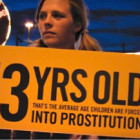
Departure of Family and Child Services Director Leaves Many Stunned
|
The sudden departure Monday of Georgia’s Division of Children and Family Services (DFCS) director Rachelle Carnesale after less than a year left many child advocates scratching their heads. “It is a surprise to everybody,” said Normer Adams, Executive Director of the Georgia Association of Homes and Services for Children. A statement from Department of Human Services (DHS) spokesperson Ravae Graham said only that “Rachelle Carnesale is no longer with the Department.”
According to two child welfare specialists familiar with the situation, who wished to remain anonymous because of the sensitivity of the subject, DHS Commissioner Clyde Reese fired Carnesale. One specialist speculated Carnesale was dismissed because she was not making progress at the agency fast enough for Reese. He went on to say that, despite her good work, Carnesale did not have a “high profile presence” at the agency.








